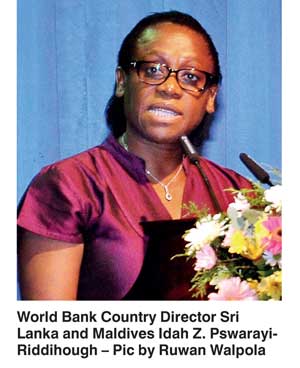Wednesday Feb 25, 2026
Wednesday Feb 25, 2026
Thursday, 6 July 2017 00:00 - - {{hitsCtrl.values.hits}}
Following are the opening remarks by World Bank Country Director Sri Lanka and Maldives Idah Z. Pswarayi-Riddihough at the ‘Sri Lanka Means Business’ launch of ‘The Roadmap to Improve the Investment Climate in Sri Lanka’ on Monday
Honourable Prime Minister, Minister Malik Samarawickrama, Secretary Ministry of Development Strategies, Honourable Ministers, members of the head table, distinguished invitees and colleagues. It’s my honour to be invited to speak at this important event.
Today marks a milestone achievement in Sri Lanka’s commitment to change its business environment, to create more and better jobs; which in turn will end poverty and increase shared prosperity. Reforms are difficult and challenging, even for those who stand to gain the most from them. 
The agenda that will be tackled today underscores Sri Lanka’s commitment and drive to accelerate its reform agenda. I believe that the package of reforms is sound and overall will be beneficial; but to get better than satisfactory impact the reform process will need commitment and perseverance. Sri Lanka needs to assert its position firmly in the region and in the world.
The Doing Business Report is one of the most cited reports of the World Bank globally. The assessment that goes into the report covers 190 economies. The difference between this report and that which a student gets from school is that the results are in the public domain. The intention is not to shame but to encourage and to review opportunities for corrective measures.
Another difference is that not only the assessed will use the information to determine next steps; but investors use the results to make decision on whether they invest or not. They will be looking at the actual result but also at the trend of progress over a number of years. They may even use these results to make a prediction on the following year’s results. This is what they call in the International Baccalaureate courses – the predicted score. Key for applying to Universities.
So it’s very important to not only do well in a single year, but it may actually be more important to show progress. It’s a proven fact that unless the investment climate is favourable, investors will look elsewhere for options.
Sri Lanka has potential to show that its predicted score is a positive one. To do this it must – stay on the reform path. Consistency and determination to deliver high quality reforms will earn credibility. The Doing business team put out a set of criteria at the beginning of every year against which performance is assessed.
It is possible that at times a country’s rating will fall even though they have carried out many reforms; but other countries may have done more and deeper ones. So, it is wise to review what the target reforms are and ensure that they too are included in the priorities. A steady pace of creating a robust regulatory and institutional foundation will help Sri Lanka raise its ranking.
You may all be aware that Georgia has been making international news, as one of the most attractive destinations for doing business. It has a business friendly approach to governance and within a short time, the country was able to cut unnecessary red tape, become increasingly transparent and design robust accountability mechanisms which in turn built the confidence of investors.
I understand that Georgia is not Sri Lanka. But I am asserting that it is possible to achieve a good ranking. Recently, Sri Lanka regained access to GSP+; an incredible opportunity to give Sri Lanka a renewed chance to attract investors – but it must be seen as business friendly.
The roadmap to improve the investment climate is in place as is the task force to lead the work. But as with all windows of opportunity they are unfortunately time bound. Inaction over a period of time; and more importantly lack of results will hasten the window’s closure. Finally, there is a need to build more buy-in from the citizens in this process. This is because when a country opens up its not only government that has a role to play, but the private sector, media, NGOs and citizens do too.
I would like to end by congratulating the Government of Sri Lanka for marking this event with the commitment that ‘Sri Lanka Means Business’. We look forward to continuing to partner with you along with DFAT and other development partners in Sri Lanka’s journey to rise up the ranks of the Doing Business Index.
Thank you for your attention!